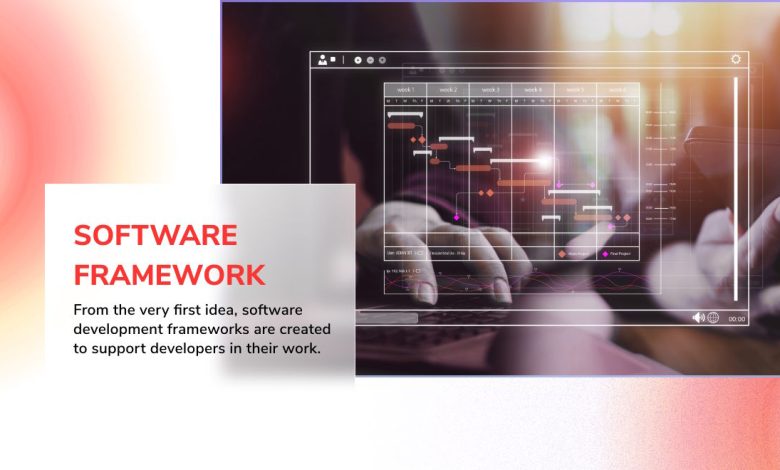Choosing the Right Software Development Framework: A Comprehensive Guide

In today’s fast-paced world of software development, frameworks are essential tools that help developers build robust, scalable, and efficient applications. A framework provides a structured foundation for development, offering pre-built components, libraries, and tools that simplify complex tasks, minimize code redundancy, and promote consistency across projects. With the vast array of options available, choosing the right software development framework can be daunting. This comprehensive guide will help you understand the key factors to consider when selecting a framework for your next project.
What is a Software Development Framework?
A software development framework is a collection of pre-written code that provides the skeleton or foundation for building applications. It streamlines the development process by offering reusable components and functionality, allowing developers to focus on the unique aspects of the application rather than reinventing the wheel for common tasks.
Frameworks are designed for specific purposes, such as web development, mobile app development, or data analysis, and are built on specific programming languages. Some popular frameworks include:
Web Development: Django (Python), Ruby on Rails (Ruby), Spring (Java), Angular (JavaScript)
- Mobile App Development: Flutter, React Native, Xamarin
- Backend Development: Express.js (Node.js), Laravel (PHP), ASP.NET Core (C#)
- Frontend Development: Vue.js, Angular, React
- Choosing the right framework is critical to the success of your project. The wrong choice can lead to delays, scalability issues, or even project failure.
Key Factors to Consider When Choosing a Framework
1. Project Requirements
Setting clear goals for your project is the first and most crucial step in picking a software development framework. Just what kind of app are you making? Is it a web app, a mobile app, or software for your computer? Different types of projects have different needs, and not all systems work well with all kinds of development.
In the case of making a web app, tools like Django or Ruby on Rails are great for quickly building the app. If you are primarily interested in developing phone apps, frameworks like Flutter or React Native are great for making apps that work on multiple devices using the same script.
Figuring out what your project needs will help you cut down the list of frameworks that will work.
2. Learning Curve and Developer Skillset
The skills of your development team are another essential thing to think about. If everyone on your team is already good at a specific computer language, picking a system that works well with that language makes sense. For instance, if your team knows how to use JavaScript, frameworks like Angular, Vue.js, or React would be good.
In contrast, some systems are tough to learn, especially if they bring new ideas or need a different way of writing. One example is that frameworks like Angular might be more complex to understand than Vue.js. Think about how uch time your team is ready to learn a new system versus how quickly they need to get things done.
3. Community Support and Ecosystem
Having a lively and busy group around a framework is very helpful. It ensures you can get regular updates, security changes, and a lot of valuable tools, like guides, instructions, and third-party apps. You’re more likely to find answers to your problems in a town with many people.
Many people use frameworks like React, Angular, and Laravel, making them better picks for long-term support. A strong community also means that there will be a lot of mods and tools that can be used to make the framework do more. This will let you create apps with more features without starting from scratch.
4. Performance and Scalability
Another essential thing to think about is performance, especially for apps that need to handle a lot of traffic or data. It depends on the system. Some are made to be fast, while others may trade speed for ease of growth.
For instance, frameworks like Node.js with Express.js or Spring for Java are great for making fast, scalable web apps because they don’t stop and are event-driven but also have robust scaling features.
Ensure that the platform you pick is designed for the level of speed your app will need. If the number of people using your app needs to grow, choose a system that can easily handle more users.
5. Security Features
Security should always come first, but it’s essential for apps that deal with private user info. There are different amounts of built-in protection in each system. For example, Django stresses security and protects against common flaws such as SQL injection, cross-site scripting (XSS), and cross-site request forgery (CSRF).
Find out about the security features of the systems you’re considering. Choose a system that puts safe code first and has a history of being secure if security is critical to your project.
6. Documentation and Ease of Maintenance
A vital part of any software development system is good documents. It should be complete, clear, and simple to understand so that coders can quickly learn how to use the framework’s features and fix problems.
A well-documented platform not only makes the process of building an app more accessible, but it also makes it easier to keep it running in the long term. Developers may have trouble maintaining or updating an app when there isn’t enough data, which can cause delays and higher costs.
Along with instructions, you should also think about how easy it is to maintain the system. How simple is it to get new versions of the framework? Is there a system that lets you test, fix, and do continuous integration? These things will affect how easy it is to keep your app over time.
7. License and Cost Considerations
Some systemsto use and others that cost to license. You can use open-source tools like Django, Angular, and React for free, and a lot of people are there to help you. However, private frameworks may be worth the extra cost because they offer more specific help, better security features, or unique functions.
Check your budget and decide if a free, open-source framework will work for your project or if you would like the extra features that a paid framework offers.
Conclusion
Choosing the right software development framework is crucial to the success of your project. It can impact your development speed, application performance, security, and long-term maintenance. By carefully considering your project’s requirements, the skill set of your team, performance needs, security, and the framework’s community support, you can make an informed decision that will set your project up for success. Take your time to evaluate different frameworks, and always keep the future growth and scalability of your application in mind.
Looking to explore more blogs about software development frameworks? Visit Arturion.io for expert insights, tutorials, and the latest trends in software architecture, development tools, and frameworks. Whether you’re a beginner or an experienced developer, Arturion.io has the resources to help you master the tech landscape.









